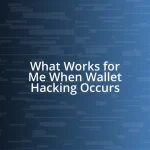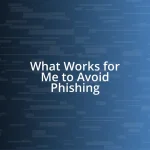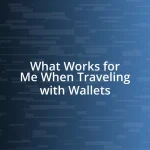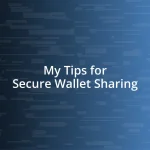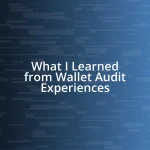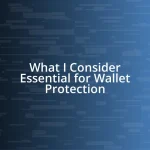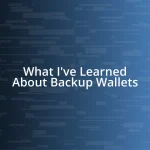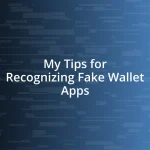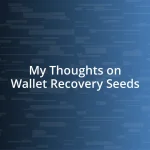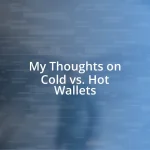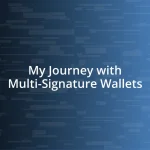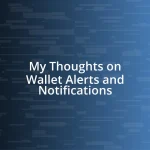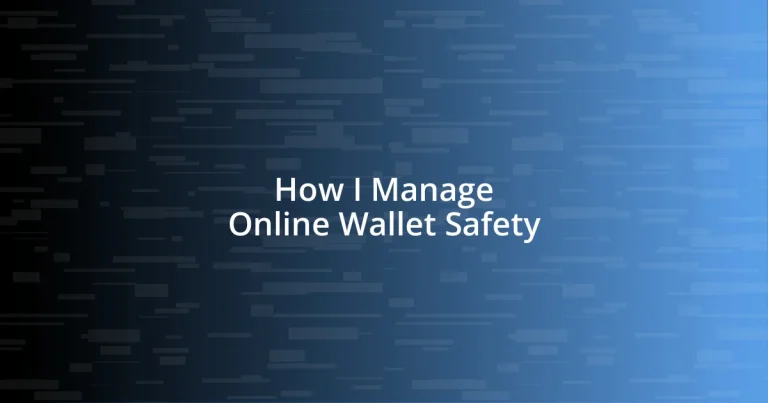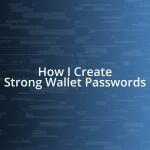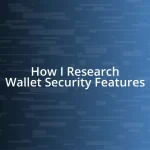Key takeaways:
- Understanding online wallets enhances convenience and helps in managing finances, but security is paramount.
- Implementing two-factor authentication (2FA) significantly boosts security and empowers users to stay vigilant against threats like phishing and malware.
- Regularly monitoring transactions and quickly addressing any suspicious activity is crucial for maintaining financial security and preventing fraud.
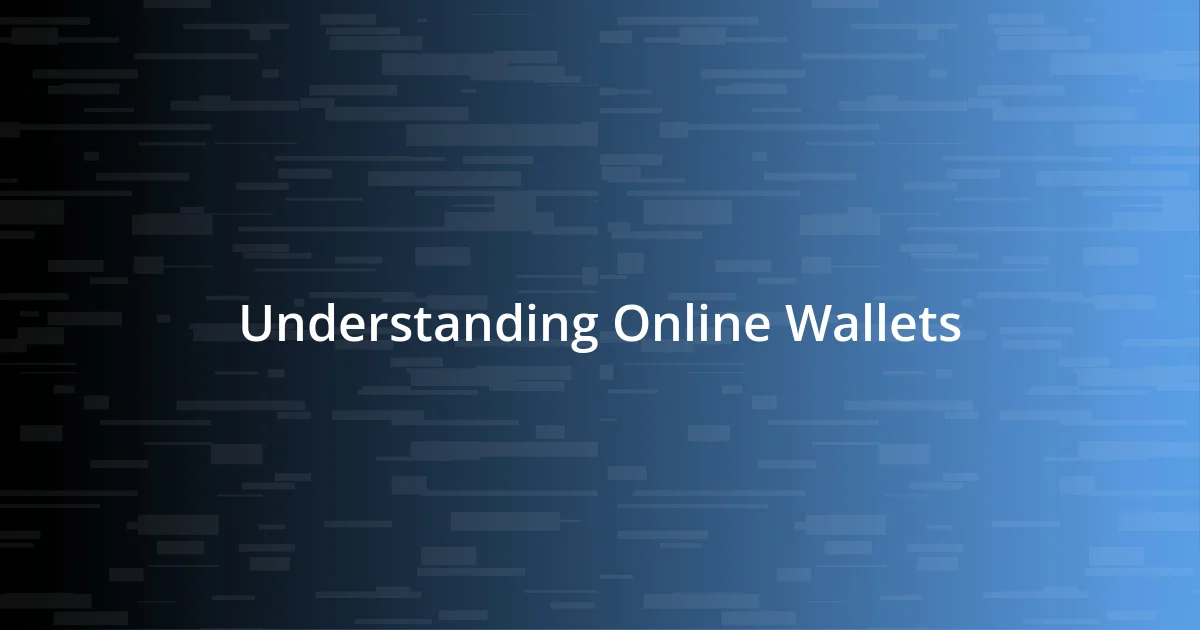
Understanding Online Wallets
Online wallets, often referred to as digital wallets, serve as convenient platforms that allow us to store, send, and receive money electronically. I remember the first time I tried using one; it felt almost like magic to pay for groceries with just a tap of my phone. Have you ever felt that thrill? It’s amazing how technology transforms simple tasks into seamless experiences.
These wallets aren’t just a modern convenience; they offer various features, like tracking spending and organizing receipts, which I’ve found incredibly helpful. When I started using my online wallet regularly, I was surprised by how it gave me a clearer picture of my finances. It certainly made budgeting less of a chore, don’t you think?
However, with great convenience comes great responsibility. It’s vital to understand that the security of our funds largely depends on how we manage these digital tools. The image of someone losing their money due to negligence is unsettling, and it’s a situation I’d want to avoid at all costs. Isn’t it worth taking the time to learn how to keep our online wallets safe?
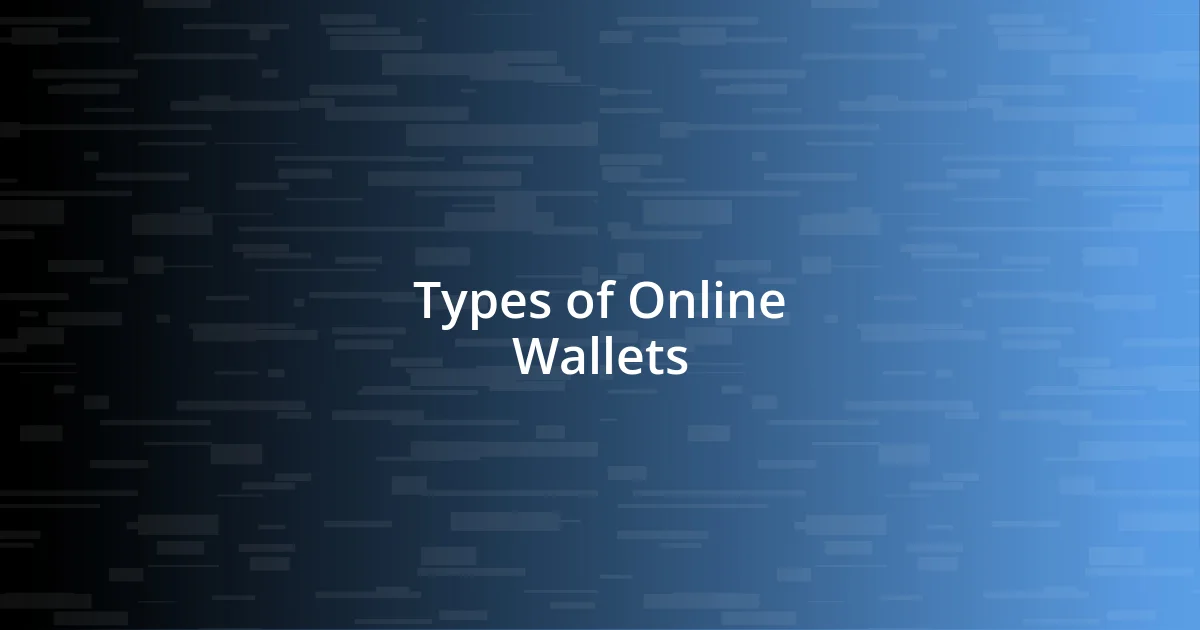
Types of Online Wallets
When it comes to online wallets, there are several types to choose from, each catering to different needs. For me, it’s essential to match the wallet type to my spending habits and the types of transactions I usually make. Knowing which wallet suits you can make a world of difference.
Here are the common types of online wallets:
- Hot Wallets: These are connected to the internet and are ideal for everyday transactions. I use a hot wallet for quick purchases, but I always balance this with some security precautions.
- Cold Wallets: Unlike hot wallets, cold wallets are offline and provide enhanced security, perfect for storing larger amounts of money. I’ve learned to utilize them for my savings, reminding myself that extra steps can add layers of security.
- Mobile Wallets: Apps like Apple Pay or Google Wallet allow for contactless payments. I remember the first time I paid for a coffee using my phone. It was fast, and the convenience was exhilarating.
- Web Wallets: These are accessible through web browsers. While they offer convenience, I’ve noticed I tend to be more cautious with them due to phishing risks.
- Cryptocurrency Wallets: These are designed specifically for managing digital currencies like Bitcoin. I’ve found them fascinating, but they require a deeper understanding, which is something I’m continuously working on.
Each type has its place in my financial world, and recognizing that has helped me feel more in control. It’s not just about choosing one; it’s about strategically using them for different aspects of my life. What types have you tried?
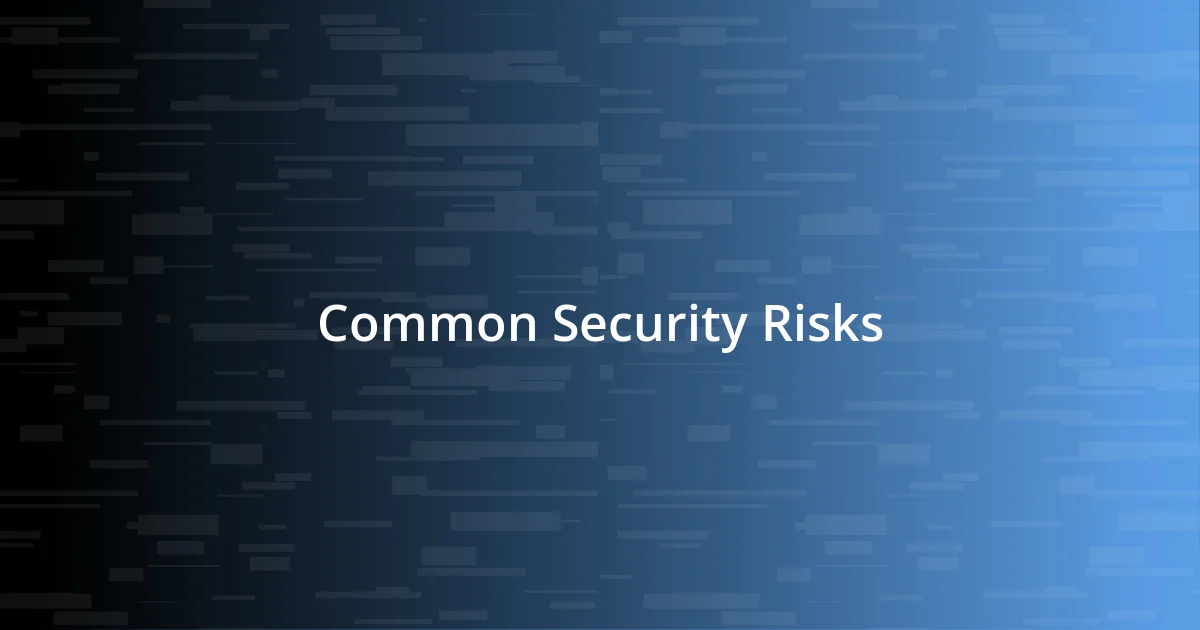
Common Security Risks
Security risks associated with online wallets can feel daunting, but understanding them is crucial. One of the most significant threats is phishing, where scammers pose as trustworthy entities to steal your login details. I still remember receiving an email that looked almost identical to one from my wallet provider; it was a chilling reminder to always double-check sources before clicking on anything. Have you ever experienced something similar? It’s a real wake-up call to enhance our security vigilance.
Another risk I’ve encountered is malware, particularly when downloading apps or software claiming to enhance wallet functionality. In one instance, I mistakenly installed a seemingly harmless app that turned out to be a malicious program. The uneasy feeling that followed was nothing I’d want anyone else to experience. This emphasizes the importance of downloading only from reputable sources and keeping devices updated with the latest security patches.
Lastly, weak passwords are an open invitation for unauthorized access. I learned the importance of creating a strong, unique password after my account was compromised through a data breach. Playing around with passphrases and a password manager has drastically improved my wallet’s security. How do you manage your passwords? It’s a small but critical step in keeping your online finances safe.
| Security Risk | Description |
|---|---|
| Phishing | Scammers mimic trusted entities to steal login information. |
| Malware | Malicious software disguises itself as safe, risking data on devices. |
| Weak Passwords | Simple passwords can be easily compromised, leading to unauthorized access. |
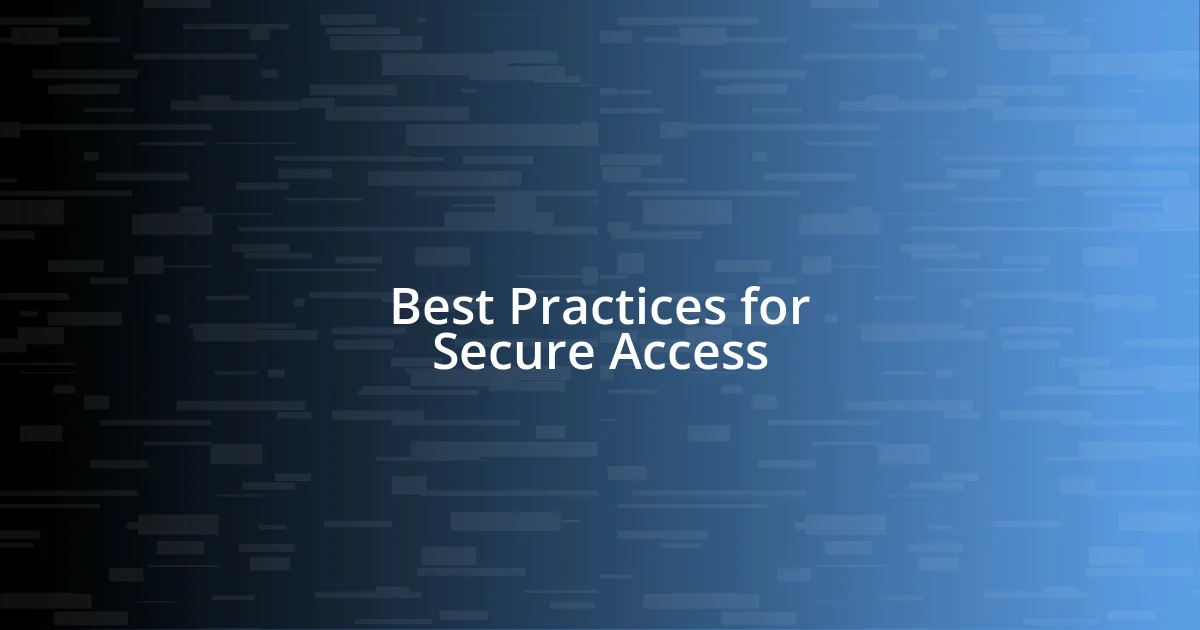
Best Practices for Secure Access
When it comes to accessing my online wallet, I never underestimate the power of two-factor authentication (2FA). I still vividly recall the moment I set it up; there was an instant boost in my confidence concerning security. 2FA adds that extra layer, requiring both my password and a code sent to my phone. Have you tried it? If not, I highly recommend it—it’s a simple step that can dramatically reduce risk.
I also make it a point to regularly review my account activity. Just last month, I noticed a questionable transaction that I quickly flagged. It turned out to be an error, but spotting it early was crucial. Keeping an eye on my spending not only helps me stay on budget but also acts as a safety net. How often do you check your transactions? It’s a habit worth forming, and definitely gives peace of mind.
Using a secure connection is another non-negotiable for me. I’ve made it a rule never to access my wallet over public Wi-Fi after experiencing that heart-stopping moment of uncertainty in a café once. I always use a virtual private network (VPN) if I can’t avoid it. It’s like putting up a security wall around my connection. What about you—do you take similar precautions? It’s all about building a safe pathway for accessing my finances online.
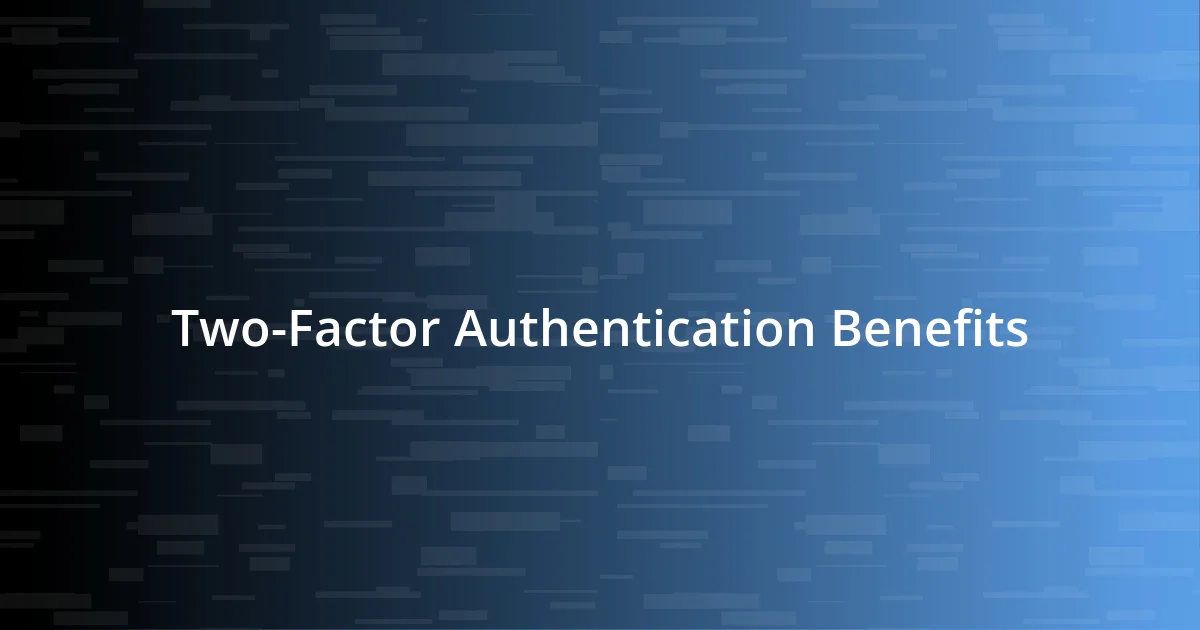
Two-Factor Authentication Benefits
Understanding the benefits of two-factor authentication (2FA) has truly transformed my approach to online wallet safety. I remember the moment I first used it; the simplicity of receiving a text with a unique code made me realize how easy it was to add an extra step to my security routine. This added protection ensures that even if someone manages to snag my password, they still can’t access my account without that precious second factor. Doesn’t that sound reassuring?
Another advantage I’ve noticed is how it discourages unauthorized access attempts. After enabling 2FA, I received alerts whenever there was a login attempt from an unknown device. This immediate feedback made me feel more in control of my information. In fact, I once received a notification about an attempted login late at night while I was traveling, which prompted me to change my password right away. Have you ever been caught off guard like that?
Moreover, using 2FA promotes a proactive mindset. It encourages me to constantly evaluate and update my security methods rather than becoming complacent. As I talk to friends about this, I often find that many don’t realize how crucial it is to adapt their practices as technology evolves. It’s about being one step ahead; I can’t help but feel a sense of empowerment knowing I’m doing everything I can to safeguard my financial assets. How empowered do you feel when you take steps like these?
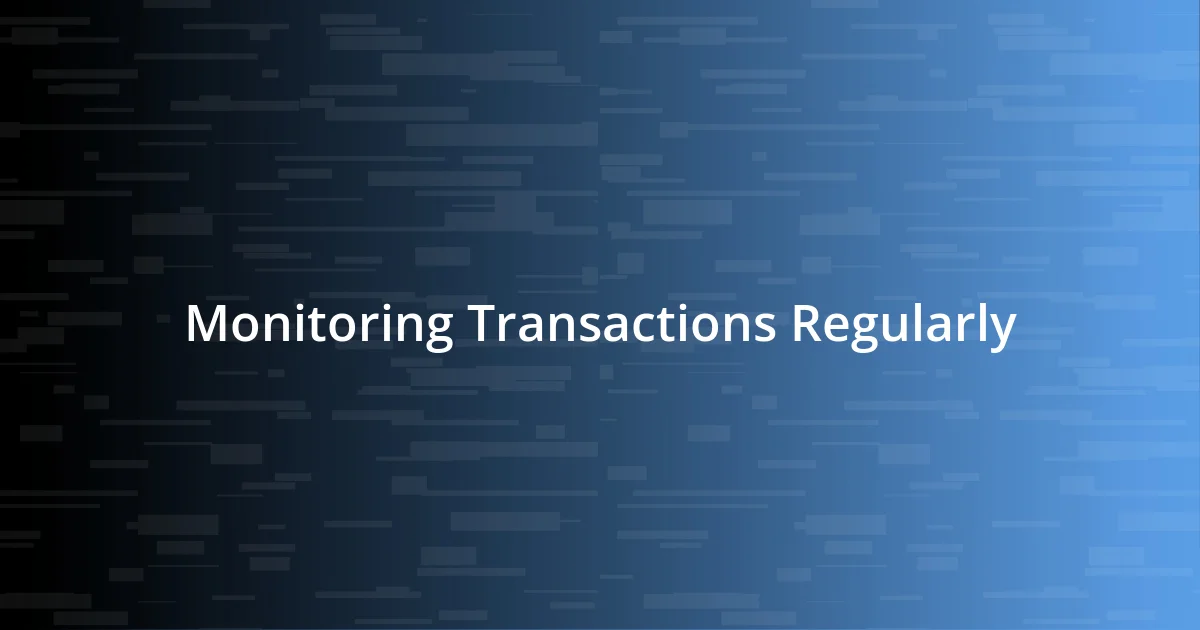
Monitoring Transactions Regularly
Monitoring my transactions regularly has become a routine that brings me immense peace of mind. Just the other day, I sat down with my morning coffee and went through my wallet activity. To my surprise, I found a recurring charge I had forgotten about. Spotting it early allowed me to cancel it before it became a hassle. Has something similar ever happened to you?
I often think about how easy it can be to go on autopilot, especially with so many subscriptions and services these days. It’s like that moment of shock when you check out at the grocery store and realize your cart is filled with impulse buys. That’s why I make it a point to check my transactions weekly. By staying engaged with my spending, I feel a sense of control—I can adjust my habits if something seems off. How often do you take a moment to glance at your financial activity?
I’ve had friends who faced the consequences of neglecting their transaction tracking. One shared a story about how a hefty fraudulent charge went unnoticed for months because he never bothered to check. It’s a stark reminder of the importance of vigilance. Taking just a few minutes each week to monitor my account helps me avoid potential headaches down the road. Wouldn’t you feel more secure knowing you’re on top of your finances?
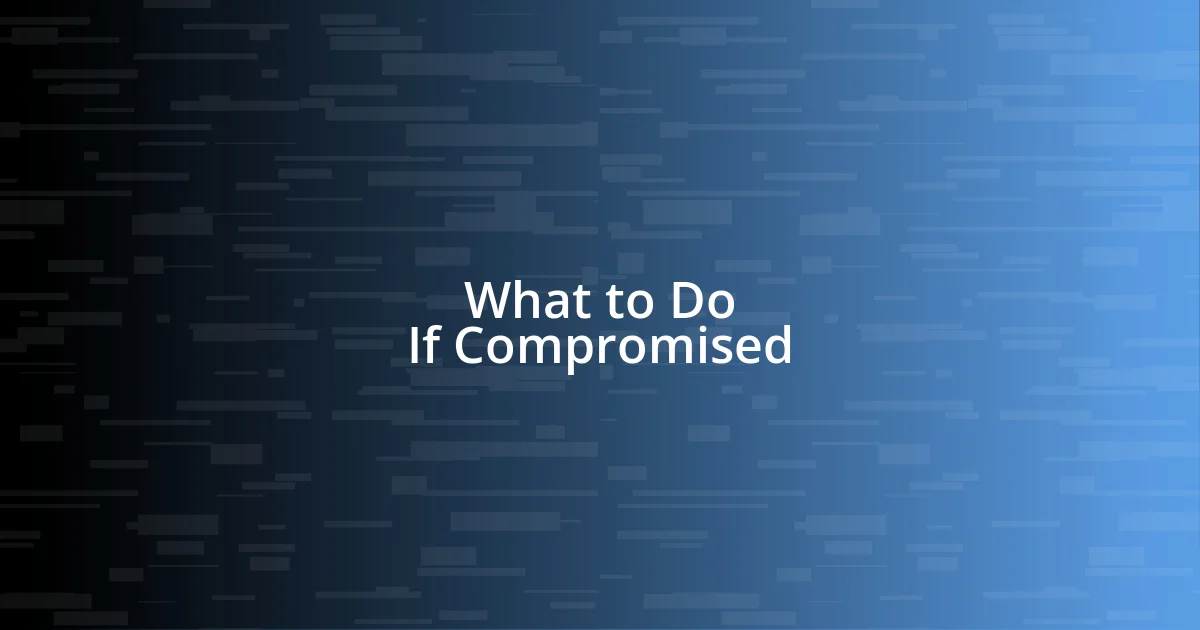
What to Do If Compromised
If I ever find out that my online wallet may have been compromised, my first step is to act quickly. I remember one frantic afternoon when I received a notification alerting me of a suspicious purchase I didn’t make. I felt my heart race as I immediately logged in, changed my password, and enabled my bank’s alert system for any further transactions. Isn’t it wild how swiftly you can take action in these moments?
Next, I always contact customer support for my wallet service. I once called them after noticing unfamiliar activity, and they were incredibly helpful. They quickly froze my account to prevent further unauthorized access, which instantly relieved my anxiety. Have you considered how valuable immediate customer service can be during such stressful times? It’s reassuring to have a team on your side, ready to assist.
Lastly, I’ve learned it’s crucial to monitor my credit report after any potential compromise. I was amazed to discover that free credit monitoring services exist, which helped me keep an eye on new accounts and inquiries. Just last year, I was able to identify a new account that popped up unexpectedly, allowing me to dispute it before any damage was done. Have you ever thought about how much our financial security hinges on being proactive? Staying informed has been a game-changer for my peace of mind.
